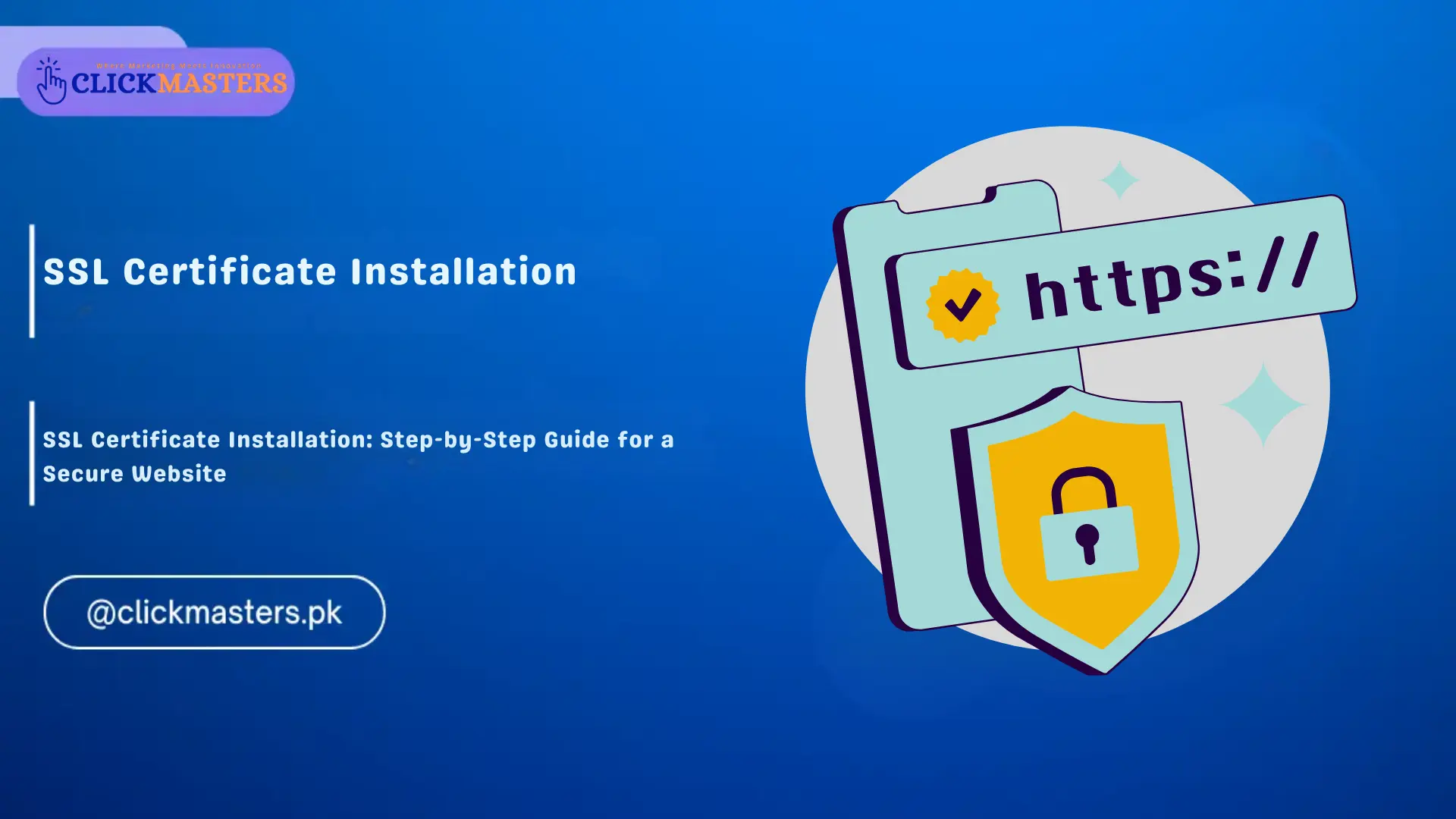Understanding SSL Certificate Installation
Obtaining an SSL (Secure Socket Layer) certificate for your website is essential for improving the security of your site and boosting its popularity. An SSL ensures that the data entered by users in their browsers is encrypted and safe from any unauthorized access during transmission. Here are the steps to attach SSL to your domain, how to apply it to your website, and answers to frequently asked questions regarding SSL installation.
At ClickMasters, our agency specializes in providing comprehensive digital solutions, including SSL certificate installation for your website. We ensure that your website is properly secured, protecting both your users and your business. By working with ClickMasters, you can rest assured that your SSL certificate is correctly installed and your website is fully protected.
What is an SSL Certificate?
An SSL certificate is commonly referred to as an online identity card that would allow identification of any site and make the connection secure. They play a great role in securing information that is usually vulnerable during instances such as when purchasing a credit card or while entering a login password. Websites that use SSL certificates have URLs that begin with the letters “HTTPS,” which means it is secure.
Why Do You Need an SSL Certificate?
- Data Protection: SSL works through the idea that data in transit is encrypted in case there are hackers along the way wanting to make a change to the data.
- SEO Benefits: Google prefers HTTPS sites which should help your SEO ranking and increase your rank.
- Trust and Credibility: Internet users are inclined to trust web addresses with well-installed SSL certificates, visible by the padlock symbol in the web browser.
Types of SSL Certificates
Before diving into installation, it’s important to understand the different types of SSL certificates available:
- Domain Validated (DV): Online verification that shows that a particular domain belongs to the organization.
- Organization Validated (OV): This discount demands the online organization to authenticate the business’s identity.
Extended Validation (EV): Includes basic trust with several verifications in the digital environment.
Steps to Install an SSL Certificate
Choose Your SSL Certificate
Choose the SSL certificate type that you might have an idea which will meet your needs. Most hosting companies provide Let’s Encrypt certificates for free while others provide paid certificates with other services.
Generate a Certificate Signing Request (CSR)
To obtain an SSL certificate, you must create a CSR in your hosting control panel or server. This represents a request that contains information about your domain and organization.
Apply for the SSL Certificate
After you have your CSR, send it to the Certificate Authority (CA) of your choice. After confirming your information, they will issue the certificate.
Install the SSL Certificate on Your Server
The installation process varies depending on your server type:
- For cPanel:
- Log in to cPanel.
- Click on “SSL/TLS,” then choose “Manage SSL sites”.
- You should also upload the certificate files (CRT) and private key (KEY).
- For Plesk:
- Log in to Plesk.
- To access the “SSL/TLS Certificates,” go to “Websites & Domains.”
- Select Add SSL/TLS Certificate and use your files uploading.
- For Apache Servers:
- Connect via SSH and upload the certificate files.
- Edit the Apache configuration file (httpd.conf or ssl.conf) to include:
SSLEngine on
SSLCertificateFile /path/to/your_certificate.crt
SSLCertificateKeyFile /path/to/your_private.key
SSLCertificateChainFile /path/to/intermediate_ca.crt
- Restart Apache using:
sudo systemctl restart apache2
Force HTTPS Redirection
To ensure all traffic uses HTTPS, configure redirection rules:
- For Apache, add this to your .htaccess file:
RewriteEngine On
RewriteCond %{HTTPS} off
RewriteRule ^(.*)$ https://%{HTTP_HOST}/$1 [R=301,L]
Verify Installation
After installation, check if your SSL certificate works correctly by visiting your website with “https://” in front of your URL. Some other test sources that you can try are SSL Labs.
Troubleshooting Common SSL Installation Issues
Despite the best installation practices, you may run into them. Some of the most known issues are certificate untrusted, mixed content, and domain name issues. This section will help you to diagnose and manage these problems properly.
How does SSL encryption (HTTPS) affect website rankings?
One obvious aspect that influences the ranking of websites is the ability to enable SSL encryption (HTTPS) for websites, which should be considered in any SEO campaign. This knowledge will enable webmasters to make informed decisions concerning the impact of SSL encryption on the ranking of their websites.
SSL as a Ranking Factor
Google made this clear in 2014 that it is taking HTTPS as a ranking signal within its search engine. Once believed to be a small signal, it has gradually stored more value as Google has raised the question of a safer web. Currently, securing one’s site through an SSL certificate is common not only because of the security benefits but, for instance, when dealing with similar sites to a competitor that also has HTTPS. It also implies that the presence of an SSL certificate can be a decisive factor in competing with other site resources when all the factors are roughly comparable and can help increase your ranking.
Enhancing User Trust and Engagement
SSL encryption also brings about the benefits of protecting the data but at the same time improves the confidence of the users. People get a sense of security when they get the padlock at the bottom corner of the browser. Higher trust levels may be driving better user engagement statistics, which include higher click-through rates, lower bounce rates, etc. Important web signals such as engagement metrics that entail how browsers engage with the site when searching for a keyword come into the picture, a secure site has a higher probability since users will have a better experience to rank high.
Data Integrity and Security
SSL encryption helps to defend information from loss and theft in transmission. This is important for both the users and the search engines. Website features that can ensure safe data transfer seem to have considerable credibility and may help their search results rankings. Google itself wants the best for its users, and encouraging safe sites is in line with this objective.
Impact on Site Speed
While adopting SSL may take some time as a result of the encryption processes involved, the latest SSL technologies, such as HTTP/2, enhance on-site speed. Of course, less loading time is another ranking factor in Google, so working with them and ensuring that a site has SSL will lead to even better performance.
How does site security (SSL/TLS) impact technical SEO?
Security has a direct effect on on-site technical SEO since it alters aspects that define your site within search engine result pages and affects its ranking.
Site Security SSL/TLS Impact on Technical SEO
Enhanced Trust and Credibility
One of the main advantages that is held in SSL/TLS protocols is that they establish trust points in users. If it is safe, visitors receive a message in the browser itself, such as a padlock image, and the data is secure. How can this trust result in better engagement, a lower bounce rate, and a better conversion ratio? Google, in particular, pays attention to user engagement parameters when ranking websites, which makes SSL/TLS an important part of technical SEO.
Google’s Ranking Signal
Later in 2014, Google confirmed the usage of HTTPS as an SEO ranking signal. Though once a relatively insignificant motif, this factor has become magnified with time. Specifically, the Website with SSL certificates will rank higher in comparison with similar websites without SSL certificates. This indicates that using SSL/TLS will make it possible to gain a competitive advantage in search engine rankings.
Improved Indexing and Crawling
SSL/TLS not only helps protect information but also aids in search engine optimization on how to crawl web pages on a website. First, secure websites are preferred during the crawling process, meaning your content will be indexed at the first instance. This is especially the case now that Google favors mobile-first indexing, where secure sites have an added advantage.
Mitigating Security Warnings
Most websites that do not hold an SSL certificate are labeled “Not Secure” by browsers, which can discourage people from visiting. They can result in a lower traffic rate and site ranking since high bounce rates are not good for business. When you implement SSL/TLS for your site, you do away with such notices, thus creating a safe user space and overall enhanced site performance.
Conclusion
Today, it is impossible to overstate the role of SSL certificates and site security when it comes to website presence. Apart from this, the act of applying SSL encryption has multiple forms of relevance; most importantly, it helps ensure the security of confidential information while also being used to increase users’ trust in website functionality and boost general productivity. Therefore, the SSL certificate installation procedure could be valuable for any website owner who wants to advance his/her protection in the Internet area. If you do things right then SSL will be attached to your domain and your site will now be protected from any threat.
However, there is no doubt that security, SSL/TLS sites, considerably affects technical SEO. As both user engagement metrics and Google’s preference for HTTPS sites are indicators, more secure websites are favored by higher rankings in SERPs. This dependence of SSL/TLS on technical SEO shows that security is a component of your SEO effort that cannot be overlooked.
To sum up, SSL certificates along with the knowledge of the impact on site security and SEO are not only technical investments but the key essence of business strategy. To this end, by making sure that any given website is secure, then the credibility of the site increases, and there is bound to be an improvement in the site quality hence, improved performance in the search engine rankings. Implementing SSL/TLS is a positive move in creating a safer internet as well as a move to long-term success for your online business.
FAQ’s
How do I download a certificate from a website?
Normally, you can get an SSL certificate from your hosting company or the CA of your choice after the CA completes your verification.
What if I encounter mixed content warnings?
Mixed content warnings are raised when some resources are loaded through HTTP instead of HTTPS. Redirect all internal links on your website’s code and database to use HTTPS.
How often do I need to renew my SSL certificate?
Almost all certificates are valid for one year or several months. You should set renewal reminders for your certificate or should auto-renew your certificates if you are using a service provider like Let’s Encrypt.
How does SSL/TLS affect technical SEO?
SSL/TLS increases technical search engine optimization in the following ways, hence is beneficial: SSL/TLS increases user trust, decreases bounce rates, and increases engagement metrics that have been shown to offshoot the rankings of search engines.
Is HTTPS a ranking factor for Google?
Yes, HTTPS is used by Google as a ranking signal: sites with SSL certificates may occupy higher positions in search results than those that do not have such certificates.
Can SSL/TLS improve website performance?
SSL/TLS may start a site and slow down in the process because of the processing done by the encryption; however, technologies such as HTTP/2 can improve the speed of the site and therefore have a positive impact on SEO.
Why is HTTPS important for website rankings?
HTTPS is crucial because it protects data being transmitted across the site and users will be more trusting of the website which can result in good engagement rates that can affect search engine result rankings.
Does having an SSL certificate guarantee higher rankings?
However, getting an SSL certificate can help push up your ranking a bit, although it is not a guarantee to the upper ranks of the SEO since there are other influencers to rankings too.
How does user trust impact website rankings?
User trust influences rankings as sites with HTTPS secured are usually less bouncy and users spend substantial time on those sites and these are positive indicators of sites to search engines like Google.









